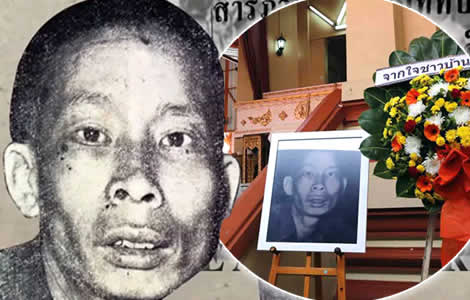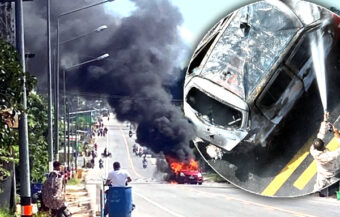Si Quey was 32 when he went before a firing squad and is reported to have admitted to killing seven children including the murder of an eight-year-old boy in Rayong where he was caught red-handed by the boy’s father in 1958. Despite this, doubts have been raised by documentary makers, rights activists and historians over the years leading to an online campaign in 2019 to have a macabre exhibit of the murderer’s body removed so that he could be afforded final funeral rites. This happened on Thursday.
Thailand on Thursday accorded final funeral rites to a convicted serial killer executed by firing squad in Bang Kwang Prison on September 16th 1959. The Chinese migrant who became the epitome of evil in the late 1950s and 1960s in Thailand and who had spent decades as a gruesome museum exhibit, had in recent years, become the subject of documentaries claiming that he had been denied a fair trial and that the treatment of his remains after his execution was a breach of human dignity.

The Director-General of Thailand’s Corrections Department, on Thursday, was present when funeral rites were observed for a notorious and reviled serial killer who was convicted and executed in 1959 for the murder of five children.
Police, at the time, suggested that 32-year-old Chinese immigrant, Si Quey was responsible for the murder of seven children including four in Prachuap Khiri Khan province whose internal organs had been ripped out and reportedly eaten by the depraved killer.
Killer became a bogey man for Thai children and a most popular museum exhibit for 6 decades
Si Quey, after he faced a firing squad, later went on to gain even heightened notoriety and became a bogey man in the imagination of children throughout the kingdom.
His bullet-ridden and embalmed body was sent to Thailand’s renowned Siriraj Medical School where it was used by medical students for training and was later sent to Siriraj Museum where it began its six decades run as the star attraction.
There, it drew more attention than historical exhibits such as the medical tools used in the autopsy of King Rama VIII after his death at the Grand Palace in 1946 due to a firearms accident.
The embalmed cadaver, contained in a glass case, became the most popular attraction for visitors with a sign on it which said simply ‘Cannibal’ as the horror of the man and the odious legend he left behind, grew.
Contemporary observers suggest that the Chinese migrant fell foul of inflamed anti-communist feeling
However, things began to change in recent years.
Several documentaries suggested that Si Quey, who arrived in Thailand after World War II, fleeing upheaval in China, may have been a victim of rampant anti-Chinese sentiment in the kingdom for decades particularly after the Chinese Communist Party came to power in 1949 and threatened to export its ideology throughout Southeast Asia.
Some of these exposés suggested that the timelines in the story of Si Quey according to testimony given at his trial after he was arrested in Rayong province in 1958 may have been flawed.
The 32-year-old could not speak Thai. He had worked as a simple labourer and garden worker.
Police in 1958 accused Si Quey of being responsible for seven gruesome murders of children
Police claimed he had lured away seven children to their deaths, four in Prachuap Khiri Khan and others in Nakhon Phanom, Bangkok and Rayong.
However, the documentary producers have highlighted that in the last three instances, there was evidence that no organs had been removed from the bodies.
Boy’s father caught the Chinese man red-handed
However, even the sceptics have had to accept that it is likely that Si Quey murdered Somboon Boonyakan, an eight-year-old boy, his last victim, sent to buy vegetables from him in a small village in Rayong province in 1958.
When the boy was noticed missing by his family, his father went in search and stumbled upon the Chinese migrant as he was about to set fire to the body of his child in a pile of dried leaves and twigs.
He had been disembowelled. The parents of the victim, for decades after the death of their son, insisted that Si Quey was nothing short of a murderous cannibal.
Case of Si Quey drew the attention of human rights activists within Thailand and the online public
The cause of Si Quey came into fashion in Thailand in recent years as an example of a lack of regard for human rights.
It also drew in those critical of the Thai judicial system who claimed that the murderer may not have been granted due process.
Some documentaries have even suggested that the monster, of many Thai childhood dreams, was simply an innocent migrant who had been scapegoated because of anti-Chinese and anti-Communist hysteria.
The matter came to a head last year when an online petition reached 10,000 signatures calling for the convicted murderer’s body to be given proper funeral rights and his dignity respected.
One expert noted that Thai authorities had no right to use the corpse of Si Quey as it had been for the last 60 years.
Ceremony held in a temple in Nonthaburi near Bang Kwang Prison used before for executed inmates
The ceremony on Thursday was held in Wat Thap Sakae in Nonthaburi province, a temple used in the past to cremate those executed by firing squad at nearby Bang Kwang Prison which is where the murderer was held and subsequently executed.
Representatives from Siriraj medical School and Museum, the Thai Corrections Department and a group of people from the Thap Sakae area of Prachuap Khiri Khan attended the ceremony.
No one had come forward after authorities had earlier publicly requested that any family member who claimed Si Quey as a relative or ancestor could requisition the body for final rites.
78-year-old man from Prachuap Khiri Khan got to know Si Quey as a 10-year-old boy in 1952
One of those who attended on Thursday was 78-year old Jeerarote Jeerapornsawat, who knew Si Quey when he was 10 years old in 1952.
At the time, he described the then Chinese migrant worker as having protruding teeth and no ability to communicate in Thai.
He recalled that Si Quey earned ฿30 a day on his father’s chilli pepper farm and when he finished work each evening at 5 pm, he would ask the cook for the same dish.
Salted pork underbelly.
This was two years before the serial killer began his reign of terror which ran from 1954 until his arrest by Thai police in 1958.
Director-General of Thai Prisons gives a carefully worded speech, said his department had not yet decided what to do with Si Quey’s ashes
Police Colonel Naras Savestanan, the Director-General of the Thai Corrections Department, attended the ceremony in person on Thursday but appeared aware of the sensitive nature of this case.
The campaign to afford final rites to the convicted serial killer was driven by a number of human rights organisations in Thailand trying to make authorities more aware of what are seen as cultural blindspots or idiosyncrasies of Thai law.
Thailand is one of the country’s in the world where there is strong public support for the death penalty and harshest of punishments for murderers or those guilty of the most serious crimes.
Thailand last put a person to death in Bang Kwang on June 18th 2018 by lethal injection.
Colonel Naras told those present that his department had not yet decided what to do with Si Quey’s ashes.
‘No matter how it is handled, it will be done in a way that lets the dead man’s spirit rest in peace,’ he assured.
Pointed out that the executed man had been convicted of many crimes and wished to end the story
However, he also pointed out that the man was a convict executed by the state for his crimes and indicated that the ceremony on Thursday marks the end of the story.
‘Si Quey was an executed convict who had committed many crimes. We will handle it properly, to prevent any issues arising, and will treat Si Quey like other executed convicts who had no relatives.’
Si Quey was led before a firing squad on September 16th 1959 to pay for his crimes. He was later embalmed by prison officers in tar.
The bullet holes in his tar coated chest could later be seen for over 60 years by visitors to the Siriraj Museum as a singular warning to those who would contemplate the murder and abuse of Thai children.
Further reading:
93% of Thai people want to see the death penalty put to use to curb shocking murders and drug gangs
Capital punishment is back in Thailand targeting murderers and drug smugglers
Elderly man murders wife in Nakhon Ratchasima after she denied him money for alcohol and cheap kicks
Police probe mental health of suspected murderer who killed his wife and stepson in Maha Sarakham
Yaba Yaba Don’t. Another murder in Phatthalung province this week linked to the evil drug now rife
Crazed man kills two in night of bloody murder in Nakhon Ratchasima on Sunday including ex-wife
Israeli wife murderer trying to evade Thai immigration blacklist back in prison where he belongs
Thai man brutally murders the man who took his wife as his own in a country that lives off passion


















